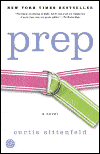 This book captures the experience of adolescence excruciatingly well. It tells the story of Lee Fiora, a student at Ault, a prep school in Massachusetts. She is from Indiana, and isn't quite sure why she ended up at a boarding school -- she had a vague desire for something different, a new experience, and the next thing she knew, she'd won a scholarship and was on her way east. The novel follows her through her four years at the school.
This book captures the experience of adolescence excruciatingly well. It tells the story of Lee Fiora, a student at Ault, a prep school in Massachusetts. She is from Indiana, and isn't quite sure why she ended up at a boarding school -- she had a vague desire for something different, a new experience, and the next thing she knew, she'd won a scholarship and was on her way east. The novel follows her through her four years at the school.
Lee feels like an outsider in many ways: she is on scholarship, which she desperately hopes no one will find out, although she knows very well that there are no secrets at Ault. She didn't grow up with money and is a bit bewildered by those who did. She is confused by the east coast culture that feels colder and warier than what she is used to. She's not part of the "cool" crowd; in fact, she has trouble making any friends at all. Most of all, she feels awkward everywhere, unsure of how to talk to people and whether to talk to people and desperately afraid of doing the wrong thing and drawing attention to herself.
Lee is an acute observer, and the story is told in first person from her perspective, so her insights into what she experiences make up one of the chief pleasures of the novel. She strikes me as very smart, but she doesn't do particularly well in her classes; rather, her intelligence shows itself in her ability to understand the minute details of social interactions and to analyze people's feelings and motivations. Here is what she says about how she relates to people:I often messed up with people, it was true, but it rarely happened because I was reading them wrong; it was because I got nervous, or because I could see too clearly that I was not what they wanted. And, in fact, it was in falling short that I truly excelled. I might fail to be what that other person sought, but as a failure, I'd accomodate them completely.
She is a careful researcher of the school; we see her reading through past yearbooks and current school directories to glean all the information she can about the students and the school culture. She doesn't expect that others might do the same, however. When she meets Conchita, a fellow student she befriends briefly, she is surprised that Conchita has done her research too:Certainly, I had ideas about other people, but Conchita was the first person I'd encountered who seemed to have ideas about me. Besides, in spite of my zest for gathering information about other students, I would never have revealed what I'd learned to the people whom it concerned; I knew enough to know that if, say, over dinner you said to some guy you'd never spoken to before, Yeah, you have a sister who went to Ault, too, right? Alice? Who graduated in 1983? It would only creep him out.
Lee feels invisible at Ault. She puts together as complete a picture of the school as she can, but she's not sure of her place in that picture and doesn't have the confidence to carve out a spot for herself.
And this is the painful part -- Lee's descriptions of high school are so accurate, it frequently made me wince. The social rules are so strict and the penalties for violating them so severe, that Lee feels paralyzed. One of the worst moments is when Lee's parents visit for Parents' Weekend. Lee is happy to see them -- she is living an 18 hour drive from home after all -- but the visit quickly turns ugly as her parents inevitably say and do exactly the wrong thing and Lee, in her agonizing self-consciousness, gets irritable and angry. I felt sympathy for Lee who is trying to navigate her way through a clash of cultures -- her parents who knew her as a different type of person than she has become at Ault and the school where she's so uncertain of her place. But I also felt sympathy for her parents, who mean well, but who just can't figure out how why Lee is so different and what she wants from them and why they embarrass her so much.
I think this book has some flaws: especially in the beginning some characters appear, you get interested in them, and then they fade away. I suppose this is a potential danger when an author is trying to cover the four years of high school with some thoroughness and accuracy. Also, the story is told by Lee in her late twenties, and while her perspective is usually that of a teenager, Sittenfeld occasionally switches into Lee's older voice and viewpoint. This switching can feel awkward at times.
But this strikes me as minor. Lee is a wonderful character: her intelligence, wit, and honesty keep her self-pity from getting annoying. And her insights into school culture, social dynamics, and relationships make the experience of reliving one's adolescence as one reads a pleasure.
Monday, July 03, 2006
Prep's painful pleasure
Posted by
Rebecca H.
at
8:58 AM
![]()
Subscribe to:
Comment Feed (RSS)



|